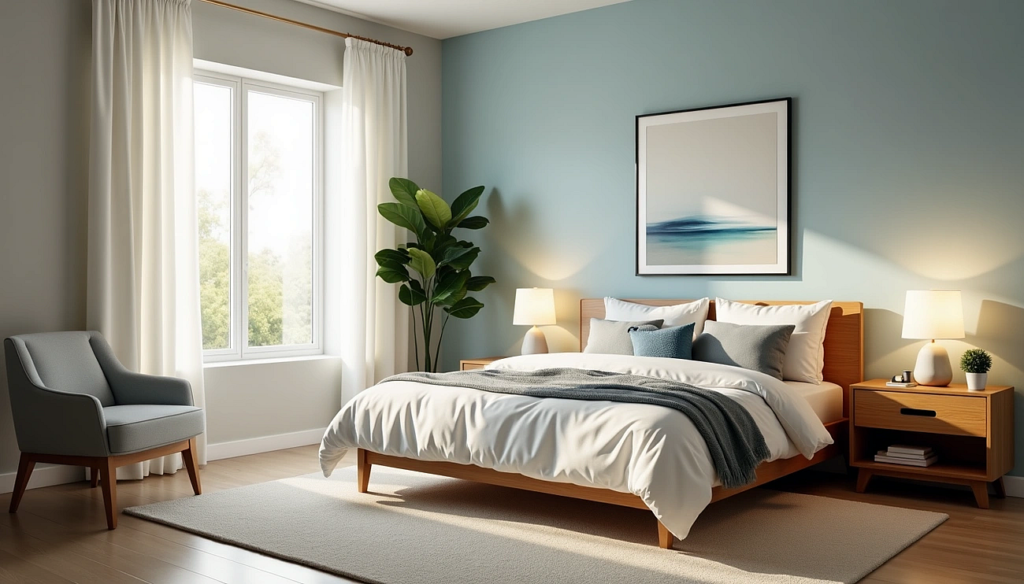How to Master Bedroom Feng Shui: A Simple Guide to Better Sleep

Your bedroom should be your own personal sanctuary. A space where you can escape from the outside world and truly rest. But here’s something worth considering—we spend nearly a third of our lives asleep, and most of our home time happens right here in this room.
The way you arrange your bedroom can make a real difference to how well you sleep and how you feel each day. Studies show that cluttered spaces actually increase your stress levels, whilst organised rooms help you feel calm and clear-headed. Even more interesting, research has found that clutter can raise your cortisol levels—that’s your body’s stress hormone—leaving you feeling guilty and overwhelmed.
When you’re thinking about your bedroom feng shui layout and where to position your bed, you’re doing much more than just moving furniture around. You’re creating an environment that supports peaceful sleep and positive energy. The colours you choose matter too. Soft, muted shades like blues, greens, and neutrals can actually lower your blood pressure, ease anxiety, and help you drift off more easily.
Bedroom feng shui rules aren’t mysterious or complicated. They’re simply practical ways to create harmony between you and your space. Apply these principles to your bedroom, and you’ll create a sanctuary that supports both restful sleep and mental peace. Ready to master good bedroom feng shui layout? Let’s explore how you can create the perfect sleep environment.

How your bedroom space affects your mind
Bedrooms do much more than provide a place to sleep. They’re environments that shape your mental state and wellbeing in profound ways. Research shows that your interior environment directly affects sleep quality, which then impacts your productivity, health, and overall quality of life.
The connection between room layout and how you feel
The design of your bedroom space has a significant influence on your mood and how your body responds. Studies reveal something quite fascinating—curved rooms actually foster more positive feelings and fewer negative ones compared to rectangular spaces. Heart rate measurements show lower stress levels in curved environments too, suggesting they help you relax.
Room layouts that let you move easily without bumping into things create a sense of space and calm. Cramped spaces, on the other hand, can make you feel trapped and tense. Natural light plays a crucial role here as well—it helps regulate your body’s natural sleep-wake cycle, supporting better rest patterns.
When it comes to bedroom feng shui, furniture arrangement isn’t just about making things look nice. It’s about creating balanced energy flow throughout your space. Your bed placement deserves special attention according to bedroom feng shui rules, as it’s the central piece in your sleep sanctuary.
Why clutter disrupts your sleep and energy
Clutter does more than make your room look messy—it actually interferes with your ability to relax and get proper rest. When your brain sees disorder, it thinks about unfinished tasks and decisions you haven’t made yet, keeping your mind busy even when you’re trying to wind down.
The UCLA Centre on Everyday Lives and Families found that families living in cluttered homes had consistently raised cortisol levels, especially among women. A study in the journal Sleep showed that people with cluttered bedrooms had significantly worse sleep quality and more insomnia symptoms.
Feng shui principles explain that clutter creates stagnant energy, disrupting the flow of chi (energy) throughout your bedroom. Items stored under your bed are particularly problematic, as they can cause energy blockages.
Clean surfaces and open spaces aren’t just nice to look at. They’re essential for creating the restful atmosphere you need for good bedroom feng shui layout. Decluttering becomes more than just tidying up—it’s a vital step towards better sleep and emotional wellbeing.
How to apply feng shui layout principles
Now let’s get practical. Applying feng shui principles to your bedroom layout will turn your space from simply a place to sleep into somewhere that truly nurtures your wellbeing.
Where should you position your bed?
Your bed position is the most important decision you’ll make. Place it in the “commanding position”—where you can see the door whilst lying down, but aren’t directly in line with it. This gives you a sense of security and control, whilst preventing energy from rushing straight at you during sleep.
Position your bed against a solid wall for stability and support. Avoid placing it beneath windows, as this creates unstable energy. For the best feng shui, your bed should face south, which encourages vitality and prosperity.
Choose a sturdy headboard—it symbolises stability in your life and relationships. Pick one that’s solid without gaps or perforations, securely attached to your bed frame.
Creating balance in your bedroom layout
Balance is everything when it comes to good bedroom feng shui. Create symmetry by placing matching nightstands on both sides of your bed, even if you sleep alone. This promotes harmony and equality, particularly in relationships.
Leave at least 45 centimetres (18 inches) of space around three sides of your bed to allow energy to flow freely. This spacing also makes it easier to move around the room—a practical bonus.
Balance your lighting too. Soft, ambient lighting creates a relaxing atmosphere that promotes restfulness. Use lamps with dimming capabilities rather than harsh overhead lights.
What to do and what to avoid
Do:
- Choose rounded furniture to avoid sharp corners that create negative energy
- Keep surfaces clear and organised to allow energy to flow
- Use furniture with storage to reduce visual clutter
Don’t:
- Place mirrors where they reflect the bed—this can disturb sleep and create restless energy
- Position your bed under beams or soffits, which create a feeling of pressure
- Keep electronics or work items in the bedroom—they introduce stimulating energy that disrupts rest
Takeaway Tip: Close all doors in your bedroom, including wardrobe and ensuite doors, to contain and protect the energy in your space.
Design your bedroom for calm and comfort
Now that you’ve sorted your layout, it’s time to focus on the details that will make your bedroom feel truly restful. The colours, textures, and lighting you choose can make all the difference to how well you sleep and how you feel when you wake up.
Pick colours that help you sleep better
Your colour choices play a huge part in creating good bedroom feng shui. Soft, muted tones are your best friends here. Light blues top the list for restful sleep—studies show that blue bedrooms give you the longest sleep duration. Green shades bring nature indoors, creating feelings of comfort and peace. Earth tones like beige, taupe, and sandy colours provide grounding energy that makes your space feel stable and nurturing.

Pictured: Blue bedroom décor helps promote sleep, natural wooden double bed frame. Available from Bedstar.
Stay away from bright reds or neon oranges in your sleeping space—these colours wake up your brain rather than calm it down. Instead, choose gentle pastels or soft neutrals that whisper ‘relax, you’re safe here’ every time you walk through the door.
Layer up with soft textures and natural materials
Natural fabrics work best for feng shui bedrooms. Organic cotton, linen, and wool help regulate your body temperature whilst creating that inviting atmosphere you’re after. Wooden furniture brings earthy energy into your space, helping you feel balanced and well.
Create a bed you’ll actually want to climb into after a long day. Layer up soft textures—plush throws, cosy blankets, smooth sheets. These tactile touches enhance the nurturing feeling of your space and make bedtime something to look forward to.
Get your lighting just right
Natural sunlight carries vibrant, beneficial energy that cleanses and refreshes your bedroom. Keep your windows spotless and use sheer curtains that filter light without blocking it completely. Research published in Indoor Air found that well-ventilated rooms actually improve sleep quality and reduce those annoying middle-of-the-night wake-ups.
For evening hours, soft, diffused lighting is what you’re after. Bedside lamps or wall sconces with dimming capabilities work perfectly. This creates the calm yin energy you need for peaceful rest.
Takeaway Tip: dimmer switches are worth their weight in gold for creating the perfect wind-down atmosphere.
Creating a personal sanctuary worth loving
Your bedroom needs to reflect who you are whilst maintaining that peaceful feng shui energy we’ve been building. This is the one room where thoughtful personalisation really matters—it’s your private retreat, after all.
Add meaningful touches with purpose
Fill your bedroom with objects that genuinely make you smile. Personal photographs, artwork, and decorations should resonate with your personality and bring you joy. But here’s the key—less really is more. A few carefully chosen pieces that lift your spirits will create a warmer atmosphere than cluttering every surface.
Scented candles or essential oils can work wonders for relaxation. Lavender, chamomile, or vanilla scents help signal to your brain that it’s time to unwind.
Bring nature into your sleep space
Plants are brilliant for bedroom feng shui, though you’ll want to choose wisely. Peace lilies and jade plants work beautifully with their soft, rounded leaves that promote gentle energy. One or two plants are plenty—you want positive vibes without turning your bedroom into a greenhouse.
Don’t fancy plant care? Nature artwork can give you similar benefits. A serene landscape or botanical print brings that natural connection without the watering schedule.
Keep your space working for you
Good bedroom feng shui layout needs regular attention, especially under your bed where energy loves to get stuck. Clear out anything that’s accumulated down there—old shoes, storage boxes, forgotten books. Your energy needs room to breathe.
Electronics don’t belong in your sleep sanctuary. They create stimulating energy that fights against the restful atmosphere you’re trying to build. Keep your bedroom for sleeping and relaxing—everything else can live somewhere else.
Regular decluttering isn’t just tidying up, it’s maintaining the peaceful energy you’ve worked to create. Remove anything that no longer serves your current life, and you’ll keep your bedroom aligned with who you’re becoming.
Create a bedroom feng shui sanctuary worth celebrating! You’ve discovered how cluttered spaces raise those stress hormones whilst organised rooms bring calm and clarity straight to your doorstep. Position your bed in that commanding spot with a solid headboard, and you’ve got the foundation of brilliant bedroom feng shui sorted.
Your colour choices work just as hard as your furniture arrangement. Those soft blues, greens, and neutrals don’t just look lovely—they actually lower your blood pressure and ease anxiety, supporting the kind of deep, restorative sleep you deserve. Layer in natural materials and gentle textures, and you’re creating a space that truly welcomes rest.
Don’t forget the personal touches that make your sanctuary uniquely yours. A few carefully chosen items that spark joy can establish your perfect retreat. Whether it’s a peace lily with soft, rounded leaves or artwork depicting serene natural scenes, these elements enhance positive energy whilst keeping your room’s restful purpose front and centre.
Here’s the thing about bedroom feng shui rules—they’re not mystical mysteries but simple, practical ways to create harmony. Put these changes into practice, and you’ll notice improvements not just in how well you sleep, but in how you feel every day. Your bedroom will finally become what it should always be: a personal haven where you recharge, restore, and truly rest easy.


